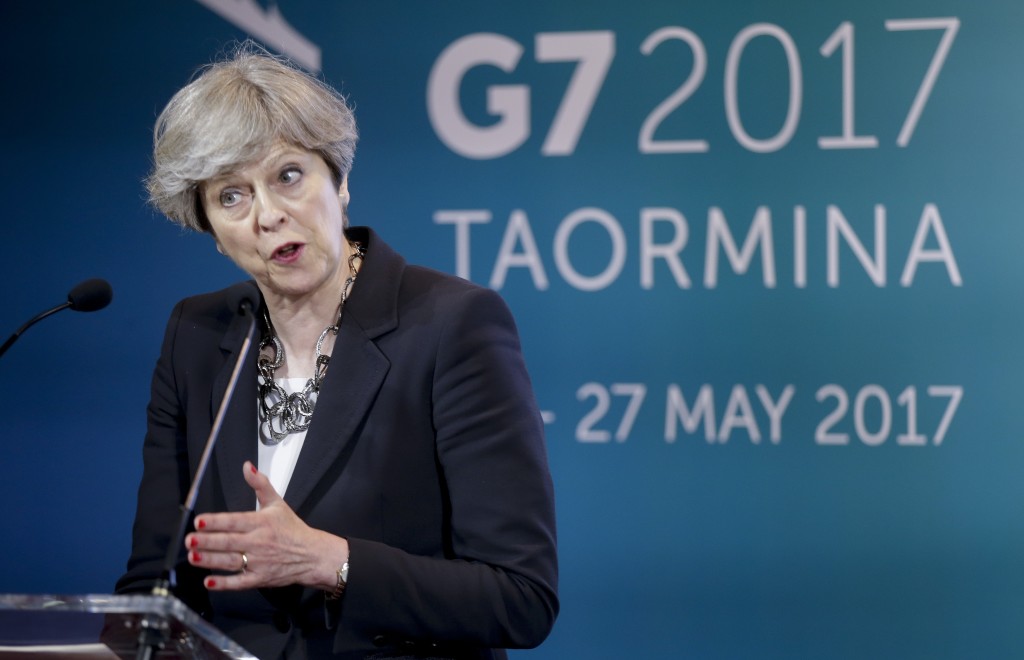G7 demands internet crack down on extremist content

British Prime Minister Theresa May speaks during a news conference in the Sicilian town of Taormina, Italy, Friday May 26, 2017. Leaders of the G7 meet Friday and Saturday, including newcomers Emmanuel Macron of France and Theresa May of Britain in an effort to forge a new dynamic after a year of global political turmoil amid a rise in nationalism. (AP Photo/Luca Bruno)
The G7 nations on Friday demanded action from internet providers and social media firms against extremist content online, vowing to step up their fight against terrorism after this week’s Manchester attack.
British Prime Minister Theresa May won solidarity from her G7 colleagues at summit talks in Italy after the suicide bombing Monday at a pop concert killed 22 people, including several children.
The G7 also vowed a collective effort to track down and prosecute foreign fighters dispersing from conflicts such as Syria, which May said showed the morphing nature of the threat.
“We agreed the threat from Daesh is evolving rather than disappearing,” she told a news conference, referring to the Islamic State group, also known by the acronyms of ISIS and ISIL.
“As they lose ground in Iraq and Syria, foreign fighters are returning and the group’s hateful ideology is spreading online,” May said.
“Make no mistake — the fight is moving from the battlefield to the internet.”
May then headed home early from the summit to confront the “critical” threat still facing Britain.
The United States, France and Britain’s other partners in the G7 laid out their strategy in a joint statement adopted at the summit in Sicily.
They called on internet service providers and social media companies “to substantially increase their efforts to address terrorist content”.
“We encourage industry to act urgently in developing and sharing new technology and tools to improve the automatic detection of content promoting incitement to violence, and we commit to supporting industry efforts in this vein including the proposed industry-led forum for combating online extremism,” they said.
Digital jihad
Elders at the Manchester mosque where the bomber sometimes worshipped suggest that he may have been radicalized online, by accessing content that is freely available from the likes of the Islamic State group.
Pressure has been building on social media giants amid accusations they are doing too little, too late to eradicate hate speech and extremist recruitment done on their sites.
Three weeks ago, Facebook said it was hiring an extra 3,000 staff to remove violent content such as gruesome killings and suicides broadcast on its video platform.
European authorities meanwhile are increasingly concerned about the threat posed by foreign fighters who went to join the Islamic State group but are now dispersing as the jihadists come under pressure on the battlefield.
The stepped-up G7 cooperation comes amid fears that the Manchester bomber had been to Syria after visiting his parents’ homeland of Libya.
“It is vital we do more to cooperate with our partners in the region to step up returns and prosecutions of foreign fighters,” May said.
One prosecution was recently brought against such a fighter in Turkey, and Britain now wants G7 action to help local authorities wage more prosecutions in Lebanon, Jordan and Iraq, a British government spokesperson said.
“This means improving intelligence-sharing, evidence gathering and bolstering countries’ police and legal processes,” May said.
According to a senior British government source, May urged the G7 countries to share police expertise and border security methods with countries where foreign fighters travel through or fight in.
Names and nationalities of foreign fighters should be shared to help their identification by different countries as they cross borders.
“When our allies find evidence, such as video or papers, of illegal activity involving foreign fighters, for example a Brit in a conflict zone, they should pass that to our authorities. It may help prosecute foreign fighters when they return,” the source said.














